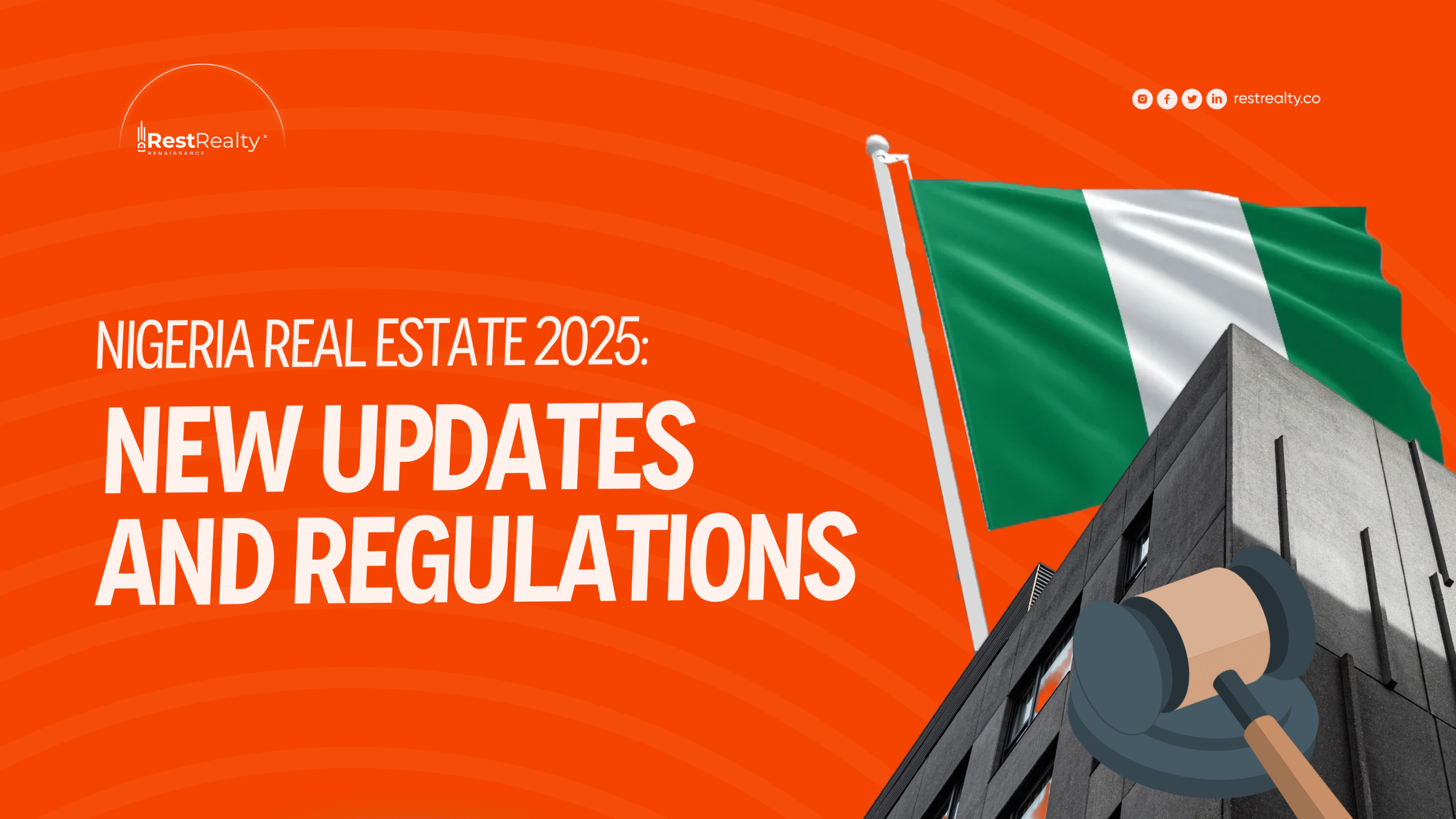
The Nigerian real estate market is evolving in 2025 with digital innovations, regulatory reforms, and enhanced transparency. Get all the latest updates in our blog.
Nigeria has kicked off 2025 with a series of new regulations and developments that are shaping the real estate sector. The country is embracing technology, improving transparency, and implementing policies that enhance investor confidence. These changes are crucial for Nigeria’s real estate market, offering new opportunities for both local and international investors.
Let’s explore all of Nigeria’s latest real estate regulations and updates in 2025 so far.
The Digital Transformation: Tokenization
Tokenization is no longer just a futuristic concept; it’s becoming a reality in Nigeria’s real estate market. With the rise of blockchain technology, Nigeria is exploring real estate tokenization, allowing properties to be digitized and sold in fractional shares. Experts predict that tokenized real estate transactions in Nigeria could reach billions of Naira by 2033, making property investment more accessible than ever before.
The Nigerian government, in collaboration with regulatory bodies, has launched pilot programs for real estate tokenization. This initiative is set to democratize property ownership, enabling multiple investors to co-own a single property through digital assets. The financial sector, including fintech startups and the Nigerian Stock Exchange, is also exploring regulatory sandboxes to ensure a seamless transition into tokenized real estate investments.
Expansion of Freehold Zones and Investment Opportunities
Nigeria continues to open up prime real estate locations for investment, making it easier for local and foreign investors to own property. The Federal Government has revised its policies to allow more foreign direct investment (FDI) in the real estate sector. Freehold ownership zones are being expanded in major cities like Lagos, Abuja, and Port Harcourt, granting investors more legal certainty and rights.
With new developments in areas such as Eko Atlantic City, Banana Island, and the Abuja Smart City Project, high-end investors have more opportunities to diversify their portfolios. Additionally, emerging markets in states like Ogun, Oyo, and Enugu are becoming attractive for residential and commercial investments.
Enhanced Rental Market Transparency
The Nigerian rental market is undergoing significant changes to improve transparency and reliability. The Federal Mortgage Bank of Nigeria (FMBN) has introduced a Smart Rental Index, an AI-driven tool designed to provide real-time data on rental prices, property conditions, and neighborhood ratings.
This tool ensures that landlords and tenants have access to accurate rental insights, eliminating price distortions and increasing confidence in the market. With this innovation, investors can make data-driven decisions while maximizing rental income and occupancy rates.
Mortgage Reforms and Financial Accessibility
The Central Bank of Nigeria (CBN) has introduced new mortgage policies that impact homebuyers and investors. Now, upfront payments for property registration fees, stamp duties, and brokerage commissions are required before mortgage disbursement. While this increases initial investment costs, the aim is to stabilize the market and reduce financial risks.
Developers are responding by offering more flexible payment plans, particularly for off-plan properties. With Nigeria’s housing deficit still significant, government-backed initiatives like the National Housing Fund (NHF) are providing affordable mortgage options, making homeownership more accessible.
Stricter Off-Plan Regulations
Nigeria’s off-plan property sector has been booming, but to protect investors, stricter regulations have been introduced. These include:
- Higher Escrow Account Requirements: Developers must now hold a larger percentage of project funds in escrow before selling units.
- Mandatory Completion Milestones: Pre-sales are now restricted to projects that have reached a certain construction stage.
- Refund Guarantees: If a project is delayed or canceled, buyers have stronger refund options.
These regulations aim to reduce fraud and enhance trust in Nigeria’s off-plan property market, ensuring that developers meet their commitments.
Stricter Off-Plan Regulations
Nigeria’s real estate market is undergoing transformative changes in 2025. From tokenization to data transparency, the landscape is evolving rapidly, offering diverse investment opportunities.
At Rest Realty, we stay ahead of these trends to provide you with the best real estate investment opportunities in Nigeria. Our fractional ownership model allows investors to diversify their portfolios with low capital, spreading risk across multiple properties in high-growth areas. Whether you’re interested in rental income, capital appreciation, or digital real estate investments, Rest Realty is here to help you navigate Nigeria’s booming property market.
Explore our latest investment opportunities today and take advantage of Nigeria’s dynamic real estate sector!
Disclaimer: This blog is intended solely for educational purposes and should not be treated as financial advice. We recommend conducting thorough research, performing due diligence, and consulting with financial advisors to assess any real estate investment against your financial goals.